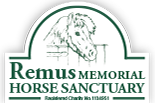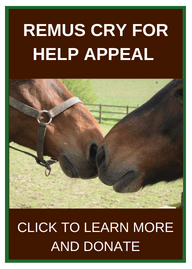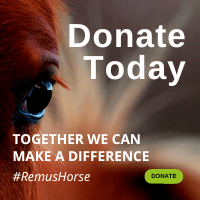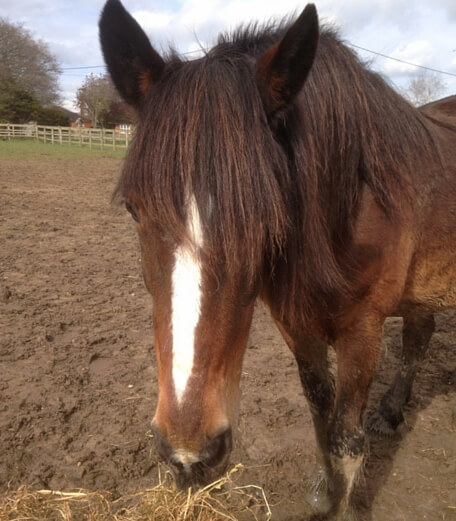
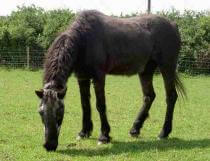
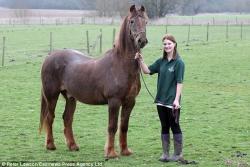
Keeping Veteran Horses Active
We have some wonderful ‘golden oldies’ at Remus Horse Sanctuary, and while the horses that end up with us or that we rescue may not have been well looked after by previous owners, there’s no reason why veterans can’t live active lives in their twilight years.
Even in their twenties, horses can still work; with some TLC, patience and adjustments, they can even continue to compete if you want to. Of course, our rescue animals here at the Sanctuary have a life built around them giving them all they need and asking nothing of them.
The key is to take things slowly and be aware that attaining and keeping a level of fitness may take some time. Building up the amount of work – and this may mean several weeks of walking exercise before moving on to anything else – will reduce the likelihood of injury.
Keep exercise sessions regular and short, and make sure you allow plenty of warming up and cooling down time too.
Of course, there will be a time when they can’t perform at your required level – it’s important to recognise this and make adjustment to avoid putting them at any risk. Look out for stiffness, lameness and loss of condition as key signs. There’s plenty more advice in this excellent article at www.yourhorse.co.uk/horse-care/keeping-veteran-in-ridden-work/.
As you will know, it’s our 40th Anniversary this year and we are campaigning to stop any equine (so horses, donkeys and mules) being born to die. Find out more about our #BornToDie campaign on our website and please fundraise for our 40th Anniversary Challenge too!
Giving Every Horse a Chance
Some of the horses we rescue are in the latter years of their life, but here at Remus Horse Sanctuary we believe that age is just a number.
So it was heartening to read this article in Your Horse magazine, which details several cases of older horses who have been ill or injured, and who, after treatment, recovered enough to live happily ever after.
As well as their owners seeking help quickly, and the vet treating them accordingly, the other common themes in these success stories are love and care – something that is not in short supply here at Remus.
This is why we never euthanise our horses based on sickness or age alone – they trust us to look after them, however old or sick they are and that is exactly what we do. Euthanasia is always a last resort for us.
Can you help us? The soaring temperatures in the summer turned our tasty green paddocks into wasteland and they’ve yet to recover. If you can, please contribute to our Urgent Hay Appeal.
Exercise is key!
‘Use it or lose it’. We’ve all heard the expression and we all know how important it is, with an ageing population, to exercise and keep our bodies in good working order. Our equine friends are also living longer, so how can we help them to stay strong and less-injury prone as they move through life?
While our residents here at Remus are retired, and many are elderly, we work hard to keep them interested in day-to-day life, in order to maintain their health and fitness. So a recent article in Your Horse magazine got our attention. It’s about incorporating simple exercises into your horse’s daily routine to strengthen their muscles – either between physio visits, if your horse is recovering from an injury, or just generally.
Some of these are ridden and some are in hand, such as turning your horse on a circle around you to get him to engage his core. Of course, be careful to only do what your horse is capable of and always work evenly on both sides, or you could be doing more damage than good!
Read the full article here.
We are specialists in caring for elderly horses. You can read more about this on our website here.
Saying Goodbye to your Equine Friend
It’s never easy saying goodbye to our equine friends, however long they’ve been a part of our lives. We specialise in the care of veteran horses and ponies, and give them every chance to thrive into old age. Our animals are never euthanised for reasons of age or infirmity alone, but when we lose residents, such as Buttons at 54 and Shayne at 52, it’s still an incredibly hard time for the whole team, despite knowing they got to live out their twilight years in comfort.
Human feelings apart, what about the other horses left behind when your beloved equine passes away? Our horses spend everyday out in the paddocks enjoying each other’s company, as indeed every horse should, so a sense of loss is inevitable. There’s currently not enough research for us to be certain about how horses understand the concept of death, but there are things we can do to soothe the situation for them. This article from Horse & Hound has some great advice if you’re going through this hard time.
http://www.horseandhound.co.uk/horse-care/horse-care-tips/do-horses-grieve-feel-loss-644513
Elderly Equine Education Workshops
Remus Memorial Horse Sanctuary in Essex is leading the way in terms of elderly horse care and will be hosting two equine workshops over the next month: Routine Care Incorporating Nutrition on Saturday 20 February, and Health and Disease on Saturday 5 March. Both equine workshops will take place at the Sanctuary from 10am to 2pm and tickets can be bought online via the Remus website for £35 each.
Sue Burton, Founder of the Sanctuary says, “With our animals living much longer we are faced with a variety of issues that need attention to ensure that our equine companions thrive to a ripe old age!” These two workshops will give owners and carers valuable insight into the routine care needed for an elderly equine and will be the ideal opportunity for horse and donkey lovers to learn directly from the experts.
The workshops will include a variety of topics including behavioural problems, the digestive system, teeth, worming, exercise requirements and, of course, the main issues associated with advancing years, such as metabolic diseases (PPID and EMS) and Colic, with preventative treatments, laminitis, arthritis and skin conditions. Owners and care-givers are recommended to attend both workshops for a thorough and full-rounded explanation and understanding.
Sue explained, “Like humans, horses are living much longer nowadays. When I first set up the Sanctuary 32 years ago, 15 was a good age for a horse but now it’s normal for them to live for over 30 years. There have been so many veterinary advancements in the past few years that we’re a lot better equipped, but it’s also a matter of lifestyle, which we pioneer at the Sanctuary.”
To find out more and to book a place on the workshops, please click here.
